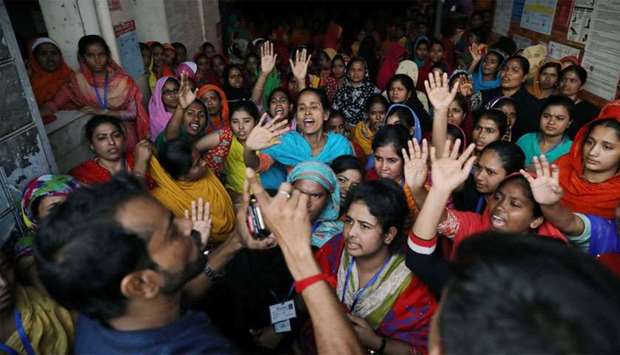Authorities in Bangladesh have announced revised wages in the garment sector after thousands of workers rallied to demand the implementation of a pay scale approved last year, officials said on Sunday.
State Minister for Labour and Employment Munnujan Sufian made the announcement hours after the owners threatened to shut garment factories for an indefinite period unless the workers return to work.
The revised wages are expected to bring an end to the unrest, the ministry said in a statement that detailed the wages for six workers' grades, keeping the minimum pay for an entry-level worker unchanged at 8,000 taka (95 US dollars) per month.
A worker in the top grade will now get 18,257 taka a month, up from 17,510 taka set in the wage policy of 2018, Commerce Minister Tipu Munshi told reporters after a meeting with trade union representatives and factory owners.
The pay hike in the other grades was adjusted proportionately, he said adding the revised wages will be applied retrospectively from December.
He called on the workers to return to factories immediately.
Earlier, the owners threatened to shut garment factories for an indefinite period unless protesting workers return to work by Monday.
‘If they don't return [to work], we will keep the factories shut,’ the president of Bangladesh Garment Manufacturers and Exporters Association (BGMEA) told a news conference on Sunday as the labour unrest entered into its second week.
The owners will be forced to stop paying workers as the law allows them to go for ‘no work, no pay’ process, he said.
Thousands of garment workers have been protesting on the streets in Dhaka and its adjoining industrial districts since January 6 to demand full implementation of a pay scale approved last year for the garment sector.
On Sunday, at least 10 people were injured as police fired teargas and water cannon to disperse a group of workers who blocked a national highway in the Ashulia industrial area, officer Sana Shaminur Rahman told reporters.
The unrest forced more than 50 factories to shut for the day, Rahman said.
The workers alleged that many factory owners were not implementing the government's minimum wage policy for the garment sector that was announced in September.
Starting in December, the monthly minimum wage for entry-level workers in Bangladesh's garment factories increased 51 per cent to 8,000 taka from 5,300 taka.
But trade union leaders said factory owners did not raise wages across pay grades as per the government's instructions, prompting the workers to take to the streets.
The government on Tuesday formed a panel to review the situation, asking factory owners to pay wage arrears next month, if any, alongside wages for January.
Bangladesh earns more than 29 billion dollars a year from garment exports, mostly destined for Europe and the United States.

